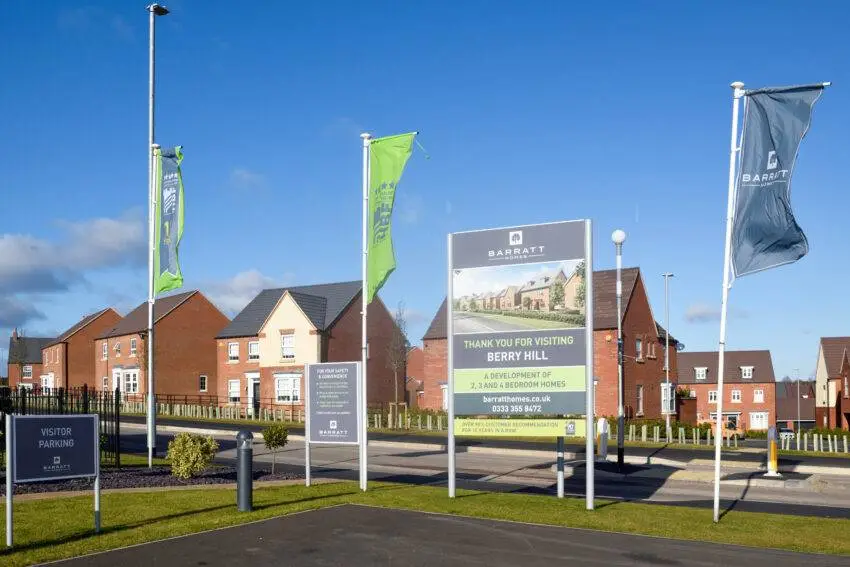The share prices of major UK housebuilders surged after Labour’s resounding victory in the general election. This marks the party’s return to power for the first time since 2010.
Labour’s ambitious housing agenda is seen as a key driver behind this market reaction, highlighting the party’s commitment to tackling the housing crisis.
Labour’s Housing Pledges Fuel Market Optimism
Shares of major UK housebuilders, including Vistry, Persimmon, Taylor Wimpey, Barratt, and Berkeley, jumped by 2-3%. This surge follows Labour’s clear electoral victory and their ambitious plans to address the housing shortage. Labour has promised to build 1.5 million homes in the next parliamentary term, creating a sense of optimism among investors.
The party also plans to reform the planning system, which, although ambitious, could face significant challenges. New Chancellor Rachel Reeves emphasized that these reforms are ‘front and centre’ of their strategy to stimulate economic growth. “To build the 1.5 million homes and the energy infrastructure we’ve committed to, we need to change how our planning system works – speed it up, stop the bureaucracies that are tying up investments in red tape,” Reeves stated.
Market Analysts Weigh In
Labour’s proposal to allow development in lower-quality green belt areas, known as the ‘grey belt’, has caught the attention of analysts. RBC Capital Markets analysts are cautiously optimistic, suggesting that Labour’s rhetoric might temporarily boost share prices.
However, Sarah Coles from Hargreaves Lansdown warned that overhauling the planning system might be a gradual and tortuous process. The potential difficulties in implementing these changes could temper the initial enthusiasm seen in the stock market.
Mortgage Market Challenges Persist
Alongside the rise in housebuilder shares, the mortgage market continues to grapple with ongoing challenges. High mortgage costs remain a major obstacle for homebuyers and those nearing the end of their fixed-term deals, according to the largest UK mortgage lender, Halifax.
Halifax’s head of mortgages, Amanda Bryden, mentioned that pressure from high interest rates should ease gradually as incomes rise. House price growth remains subdued. The average UK house price in June was £288,455, slightly down from May. Prices were up 1.6% compared to the previous year, reflecting data from the Nationwide building society.
The market remains delicately balanced and sensitive to potential changes in the Bank of England’s base rate, Bryden added.
Interest Rates and Economic Impact
The Bank of England has raised its key interest rate to 5.25%, the highest in 16 years, aiming to combat soaring inflation. However, there are hints at a possible rate cut in the next meeting on 1 August, offering some hope to homeowners facing higher mortgage rates.
The current average rate for a two-year fixed mortgage deal stands at 5.93%, down from last year’s peak of 6.86%. Despite recent reductions by major lenders, homeowners with expiring fixed-rate deals are confronting significantly higher rates.
Regional House Price Variations
Halifax reported that Northern Ireland experienced the fastest regional house price growth, up 4% from the previous year. Meanwhile, London remains the most expensive region, with average prices at £536,306.
Political analyst Sir John Curtice noted that the general election results reflect the poor performance of the Conservative Party in areas where over a third of families have mortgages. This is potentially due to market turmoil following the September 2022 mini-budget.
The election results have had a significant impact on market sentiment, especially in regions with high mortgage rates, highlighting the intertwined nature of politics and economics.
Future Prospects for Housebuilders
The outlook for UK housebuilders appears promising but is contingent on Labour’s ability to deliver on their ambitious housing plans. Analysts will be closely watching how Labour’s policies unfold and their impact on the housing market and broader economy.
In the short term, share prices may remain buoyed by the positive market sentiment surrounding Labour’s victory. However, the long-term success of housebuilders will depend on tangible progress in housing construction and planning reforms.
Investor Confidence Amid Economic Uncertainty
While the initial boost in housebuilder shares reflects investor confidence in Labour’s housing pledges, the broader economic uncertainty continues to loom. Factors such as interest rates, inflation, and regulatory changes will play crucial roles in shaping the future of the housing market. The government’s actions in the coming months will be pivotal in maintaining this confidence.
The surge in housebuilder shares underscores the market’s optimism regarding Labour’s housing policies.
However, the real test lies in the successful implementation of these ambitious plans amid existing economic challenges.

